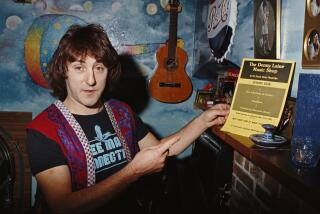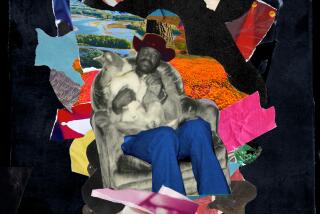Buddy Holly, Creedence Clearwater Revival boxed sets released
- Share via
Buddy Holly and Creedence Clearwater Revival were on the national scene for less than five years each, but two new boxed sets help explain why in that short time they were able to earn a place among the most distinguished forces ever in rock.
Though Holly had only seven Top 40 hits before he died at age 22 in a plane crash in 1959, the singer-songwriter left so many recordings that it takes a six-disc set to hold them all. “Not Fade Away: The Complete Studio Recordings and More” lets us follow the West Texas native’s creative evolution in remarkable detail from the time at age 13 he recorded an old country song in his home to such distinctive, melodically rich rock hits as “That’ll Be the Day” and “Peggy Sue.”
“Creedence Clearwater Revival: The Singles Collection” leads us on a different but equally instructive journey by showcasing what was quite possibly the most dazzling hit streak of any American band: a dozen Top 40 singles, stretching from “Proud Mary” in 1969 to “Someday Never Comes” in 1972.
Buddy Holly
“Not Fade Away: The
Complete Studio
Recordings and More”
Geffen/Hip-O Select
The back story: Holly was an ambitious teenager who pursued his love of country music by playing on the radio in his hometown of Lubbock and even laying down tracks in a professional studio in Dallas. But his moment of awakening was in 1955 when he saw Elvis Presley in concert. There’s even a photo in the set’s hardcover book that shows Holly staring across a crowded backstage area at Presley.
On Disc 1 in the set, we hear Presley’s influence in a pair of recordings Holly made in 1955 -- his own version of “Baby Let’s Play House,” which was a regional hit for Presley that year, and the raucous “Down the Line,” a rockabilly track that Holly co-wrote. Once he set his sights on rock ‘n’ roll, Holly and his band, the Crickets, moved rapidly. They had a No. 1 single in the fall of 1957 with “That’ll Be the Day.”
One of the impressive things about Holly was his rapid maturity as a songwriter. Working on his own and sometimes with other writers, he was equally adept at raw rockers such as “Not Fade Away” and gentle, melodically rich tunes such as “Everyday” and “True Love Ways.” This balance made Holly a major influence on Paul McCartney.
What makes this set so much more illuminating than a mere “greatest hits” package is that it allows us to spend time in the studio with Holly as he reworks hits from other artists, including Carl Perkins and Bo Diddley, as he tries to find his own path. It makes you respect Holly’s accomplishments all the more and encourages you to imagine what else he might have given us if not for that fatal crash.
Creedence
Clearwater Revival
“Creedence Clearwater
Revival: The Singles
Collection”
Fantasy
The back story: John Fogerty, the quartet’s lead singer, songwriter and guitarist, grew up in Northern California, but he developed such a love for Southern blues and country sounds that he titled one of his earliest songs “Born on the Bayou.” But Fogerty’s songs were more than odes to a region. His tunes also contained a folksy wisdom and commentary that linked him, in the broadest terms, to the traditions of Mark Twain and Pete Seeger.
After “Proud Mary,” he was on such a hit streak that both sides of Creedence’s next seven singles became radio favorites. Those songs expressed the frenzy and joy of rock ‘n’ roll life (“Travelin’ Band”), childhood innocence (“Green River”) and social commentary (the underclass protest of “Fortunate Son”).
The boxed set comes in two formats. There’s a bargain two-disc CD package that also includes four Creedence video clips, but I’d recommend the limited-edition version that puts the records on a series of 45 rpm vinyl singles (complete with picture sleeves). It’s a great way to hear the music just the way Creedence fans did initially.
Creedence was eventually torn apart by internal pressures. John’s brother, Tom, left the quartet in 1971, and the remaining members called it quits a year later.
Fogerty continues to tour and record on his own, and bassist Stu Cook and drummer Doug Clifford replay the hits in Creedence Clearwater Revisited. But the bitterness of the breakup has done nothing to tarnish the magic of these early singles.
Backtracking is a monthly feature highlighting CD reissues and other pop items of historical interest.
More to Read
The biggest entertainment stories
Get our big stories about Hollywood, film, television, music, arts, culture and more right in your inbox as soon as they publish.
You may occasionally receive promotional content from the Los Angeles Times.










